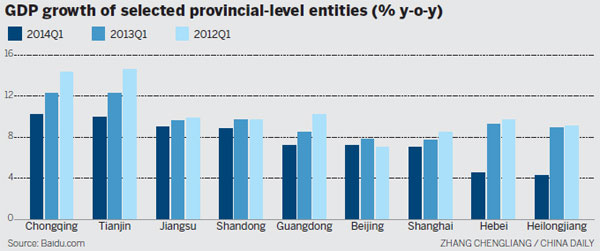Diversity can foster better growth
Updated: 2014-05-02 07:49
By Ed Zhang (China Daily Europe)
|
|||||||||||
Provinces should use new financial tools to keep economies in pink of health
Geographically, China is large. But historically and economically, it used to be small. Ever since the 1100s, the country has been heavily dependent on business activity in one or several small areas for maintaining an empire-ish government.
An example of this is the grain stocks the central government needs to feed its officials, army and also for use in areas that have been affected by natural disasters. People often used to say, without much exaggeration, that once Hunan and Hubei (two rice producing provinces on the middle reaches of the Yangtze River) had reported a good harvest, the supply would be guaranteed to all under heaven.
Such fragile economic dependency lasted through the Mao era, when Shanghai contributed a huge portion of the country's government revenue and foreign exchange earnings. In private, officials called the city China's East Germany, which used to be the most productive part of the Eastern bloc.
China's economy has changed dramatically since the reform and opening up process started about 30 years ago. Shanghai's GDP during the first quarter of this year was 530 billion yuan, 7 percent higher than in the corresponding period last year. In contrast, the entire Chinese mainland's GDP was around 12,800 billion yuan, a year-on-year increase of 7.4 percent. However, Shanghai accounted for less than 5 percent of national GDP.

Of the 30 provincial-level entities in the mainland, Shanghai's ranking has slipped to eighth, while three coastal provinces, Guangdong, Jiangsu and Shandong, reported GDP in excess of 1,000 billion yuan during the first quarter, at higher growth rates than Shanghai.
There is little doubt that modern China can draw financial resources from a much larger area than its predecessors. But it is the entire east coast of the country that is generating most of the wealth. This change is good as it adds more diversity to the economy than one or two cities or provinces can. Here diversity also means a regional economy's ability to connect with diverse resources - within and without its geographic boundary.
Nonetheless, officials don't often realize the importance of business diversity and integration. There are a few provinces that remain dependent on just one or two industries. They have failed to develop their local business diversity as well as that of other provinces.
In China's regional GDP list for the first quarter, the three provinces at the bottom, namely Heilongjiang, Shanxi and Hebei, are essentially single-industry provinces. Much of Heilongjiang's economy is based on its old oilfields, Shanxi on its coalmines, and Hebei on its excessively built and pollutant steel industry.
The prices of their local products all skyrocketed in the past boom cycle, when there was seemingly unending demand for energy and raw materials. But once the cycle passed, and less energy and raw materials became the norm, as it is today, these provinces watched helplessly as they lost their competitive edge.
If a province is led by one or two cities with diverse business dynamics, it can usually do much better to resist the impact of market cycles. Unlike the so-called energy provinces, all coastal provinces, each with a mixture of manufacturing operations and service industries, could grow at 7-8 percent despite the general slowdown.
The growth of provinces in central and western China, or of any region that can still grow at about 10 percent, is a different story. Their high growth is in part attributable to the central government's provision of investment projects and finances.
The central government is no longer sponsoring many large projects in coastal regions. But if the local governments are smart enough to leverage the financial market - using new financial tools and tapping private financial resources - they can still build more public facilities to help their economies grow more diverse and more resilient.
The author is editor-at-large of China Daily. Contact the writer at edzhang@chinadaily.com.cn

(China Daily European Weekly 05/02/2014 page13)
Today's Top News
EU: No armed intervention in Ukraine
Chinese premier visits Nigeria
Court to rule on Yingluck in Thailand
Travellers to Malaysia drop
Chinese to US grad schools drop
Ukraine moves special forces to Odessa
Slovenian PM resigns
Disclosure of military secrets becoming bigger risk
Hot Topics
Lunar probe , China growth forecasts, Emission rules get tougher, China seen through 'colored lens', International board,
Editor's Picks

|

|

|

|

|

|





